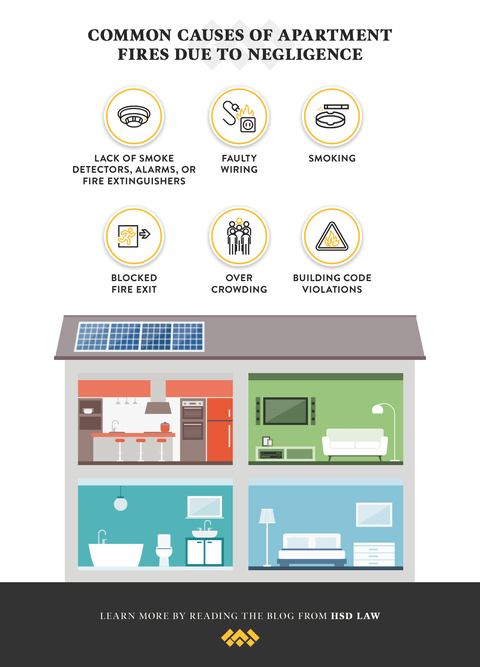In 2016, 3,390 people were killed in fires in the U.S., including 2,800 deaths that involved residential structure fires, according to the American Burn Association (ABA).
Although some fires are accidental, many structure fires are caused by negligence, such as a landlord who failed to take proper safety precautions.
If you or someone you love suffered a burn injury in an apartment, you may be entitled to compensation for your injuries and losses. The Hadfield, Stieben & Doutt personal injury attorneys in Fort Collins can help you understand your legal rights after being injured in an apartment fire. We will provide you with a free, no-obligation consultation to discuss the circumstance behind your burn injury and whether you have a case against the at-fault party.
Common Causes of Apartment Fires
Apartment fires may be caused by a variety of situations. However, apartment owners and landlords are responsible for installing adequate fire safety systems to prevent tenants and occupants from suffering serious injuries or death.

When the owner or landlord of an apartment fails to meet this requirement, they may be held liable for any resulting injuries or death. Some common causes of apartment fires caused by negligence include:
- Lack of smoke detectors
- Lack of fire extinguishers
- Heating equipment
- Faulty wiring
- Smoking
- Defective smoke alarms
- Lack of fire alarms
- Blocked fire exits
- Overcrowding
- Building code violations
Additionally, cooking is the leading cause of home fires and home fire injuries. Cooking is also tied as the second leading cause of home fire deaths, along with heating equipment.
Furthermore, portable and fixed space heaters and wood stoves are responsible for one out of every five home fire deaths. Likewise, faulty electrical wiring and lighting equipment installation are responsible for 16% of fire fatalities and 9% of fire injuries.
Landlord Responsibility for Preventing Fires
Landlords must follow laws that are designed to protect tenants from fire injury and death. When landlords break these rules, they can be held liable.
Apartment owners, landlords, and building managers are required to install fire safety measures that prevent fires or minimize the impact they can have. If the owner or manager of a building or apartment fails to create a safe property free from potential hazards, the property manager may be liable for any resulting injuries or death.
In Colorado, a landlord’s duty to provide a reasonably safe property is based on state and local building codes, such as:
- Inspecting fire exits and ensuring clear pathways to exit doors
- Installing, maintaining, and regularly inspecting smoke detectors, fire alarms, and other fire detection equipment
- Keeping fire escapes clear
- Ensuring that the property’s electrical wiring is properly installed and up to code
- Providing fire escapes, fire extinguishers, and sprinkler systems
- Providing adequate means of escape in the event of a fire
- Following all applicable building codes to minimize the possibility of the apartment building catching fire and preventing surrounding units from also catching fire
If you believe your landlord is at fault for your burn injury, our personal injury attorneys will thoroughly investigate your claim to determine if your landlord violated their legal obligations. Based on our findings, we will be able to help you determine if you are entitled to compensation for your injury.
Holding a Landlord Liable for Your Injuries
In order to hold a landlord or property owner liable for the injuries you suffered in a structure fire, you must be able to prove the other party’s negligence caused the fire.
However, proving negligence requires you to establish that four elements are present in your claim:
Duty of Care
First, you must be able to establish that the landlord or property owner had a legal duty of care to protect you from foreseeable hazards. This obligation requires landlords and property owners to be cautious and provide adequate protection against possible fire hazards. If a landlord or property owner knows that a dangerous hazard is located on the property, they must take steps to correct it.
Breach of Duty
Next, you must be able to show the landlord failed to uphold his or her obligation to protect you from a dangerous hazard. This means the landlord or property owner neglected to take proper safety precautions to avoid causing the fire that injured you.
Causation
Furthermore, you must be able to establish a connection between the fire and your injuries. This means you can definitively prove that your burn injury occurred directly because of the landlord’s actions or inactions.
For example, your burn injuries would not have occurred had the landlord installed a fire detection system and working fire extinguishers to put out the fire before it became dangerous.
The Victim Suffered Damages
The final step to proving a landlord or property owner is at fault is showing you suffered damages as a result of the fire.
This can include physical injury and financial losses resulting from the at-fault party’s negligence. Proof of damages may include:
- Medical records showing your treatment and medical expenses
- Photographs detailing your injury
- Paycheck stubs or time cards showing the wages you lost after the fire
Find Out if You Have a Case
If you believe your landlord is responsible for a burn injury you acquired in a fire, contact an experienced personal injury lawyer at HSD Law.
We will provide you with a free, no-obligation consultation to review your claim and determine if you have a case against a negligent landlord. Our attorneys will help you pursue a negligent property owner or landlord to help you recover the compensation you deserve.
